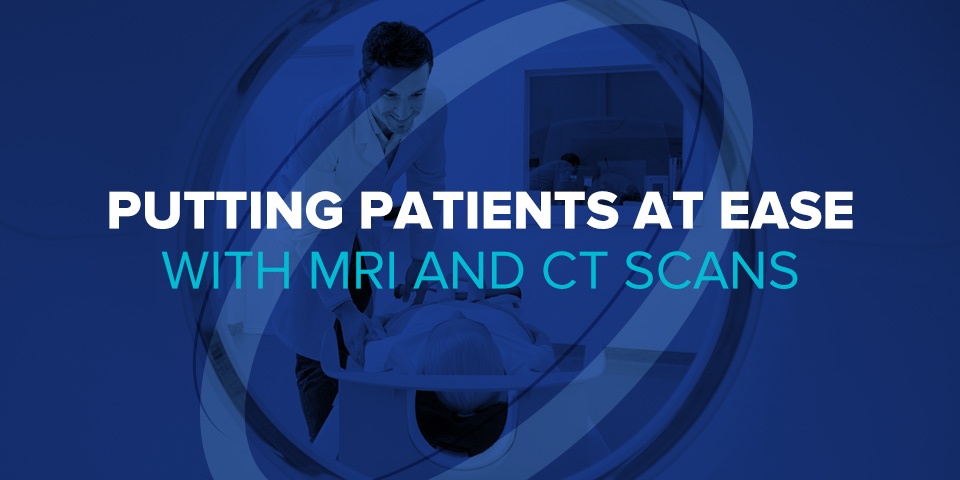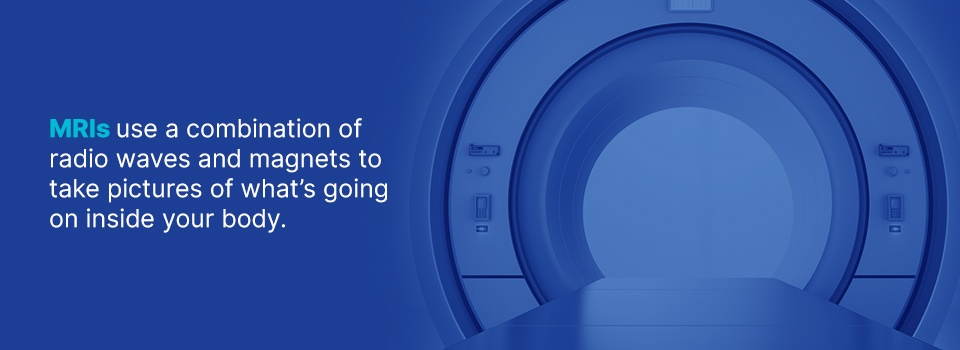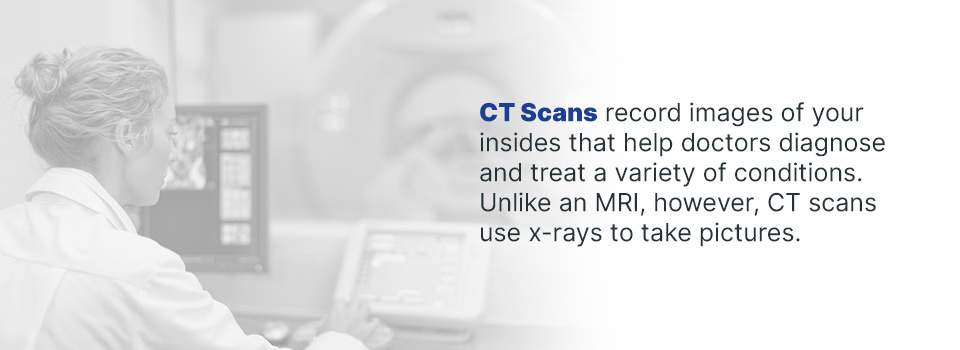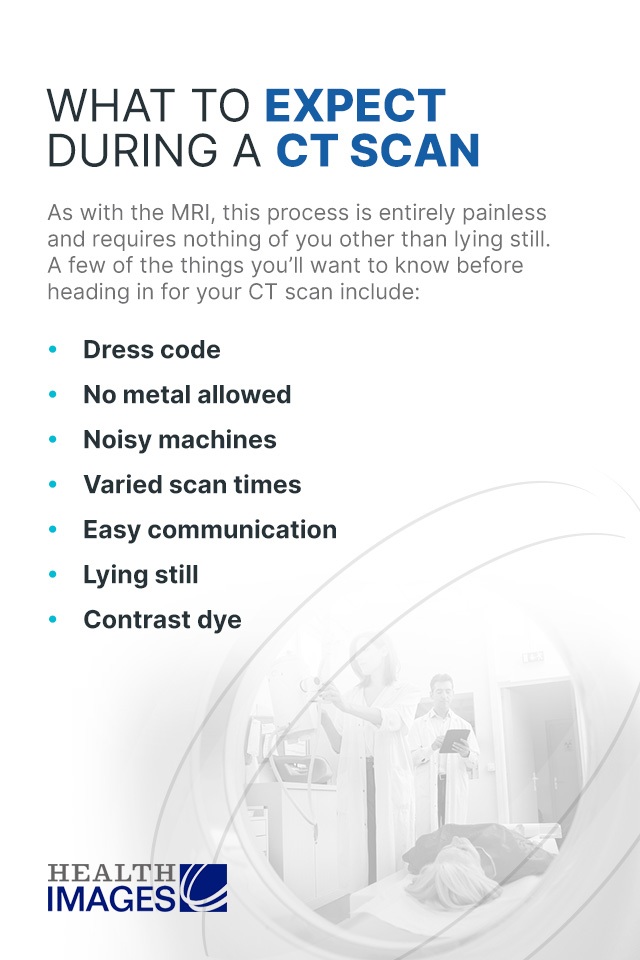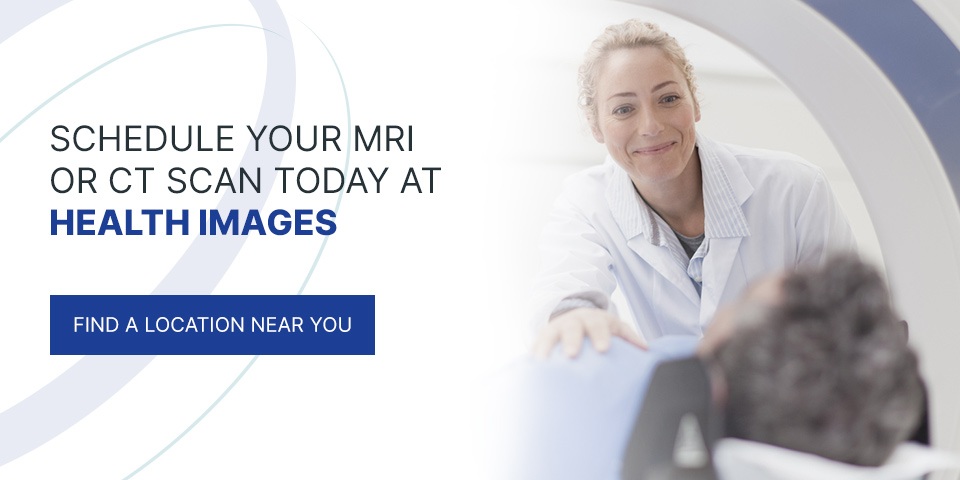Putting Patients at Ease with MRI and CT Scans
The idea of going in for any medical testing is something that immediately makes most of us uncomfortable. Many of us don’t even enjoy a regular technologist’s checkup, making the idea of a scheduled test that much more off-putting. Maybe we’re nervous that the test will reveal something we don’t want to know. Perhaps we’re worried that it will hurt. It can even just be that something about a medical environment immediately puts us on edge.
If these thoughts sound like the types of worries you’ve dealt with, we want to put your mind at ease. While these fears are natural ones that we all experience, we want to show you that medical testing procedures like MRI and CT scans are nothing to feel nervous about.
To help dispel some of the fears that may be circling inside you, we hope to explain in clear and concise terms what happens during these tests and what to expect. Additionally, we’ll talk strategies for staying calm and easing some of the anxieties that may keep creeping up as the day of your scan approaches. By arming yourself with this knowledge, you’ll be ready to take on your tests with confidence and determination.
MRIs and CT Scans: What Are They?
The best way to prepare for what might sound like an intimidating medical procedure is to learn what it is and what the technologists use it for. In almost every case, once you sweep away the confusing medical jargon and terminology, the process seems much less daunting. The same holds true for MRIs and CT scans.
What Is an MRI?
There’s a good chance you’ve only ever heard an MRI referred to by its acronym. Its full name, however, is much more informative when it comes to revealing what the test is. MRI stands for “magnetic resonance imaging,” which means the test uses a combination of radio waves and magnets to take pictures of what’s going on inside your body. The MRI machine then translates these images and sends them to a computer, where the technologists can view them and gain insight into your medical condition without having to perform any invasive procedures.
There are two main scenarios in which technologists might prescribe an MRI:
- To form a diagnosis: If you’ve been dealing with unexplained symptoms and the technologists are trying to pin down a diagnosis, they might schedule an MRI. This test will give them a closer look at your insides and help them figure out what might be going on.
- To evaluate treatment: If you’ve already been diagnosed with a medical condition and are undergoing treatment, the technologist might schedule an MRI to assess how the treatment is progressing and how your body is responding to it.
Even though the idea of being sent for a medical test might seem intimidating, both of these potential situations show that getting an MRI is a good thing. It means that no matter what may be going on inside your body, this test will get technologists one step closer to putting you back on the road to your best and healthiest life.
Schedule an MRI or CT Scan at Health Images
What Is a CT Scan?
A CT scan has a lot in common with an MRI but is a different procedure that your technologist might recommend. The letters stand for “computed tomography,” which won’t mean a lot to most of us. Despite the confusing name, however, the process is simple.
Like MRIs, the purpose of a CT scan is to record images of your insides that help technologists diagnose and treat a variety of conditions. Unlike an MRI, however, CT scans use x-rays to take pictures. These images are then sent to computers where the technologists can view them and learn more about the inner workings of your body.
Also, like MRIs, CT scans are ordered for two primary reasons:
- To spot problems: If a patient has broken bones, internal injuries, blood clots, infections or any one of a variety of different illnesses, CT scans can be invaluable. Medical problems such as these show up clearly on CT scans, giving technologists the information they need to prescribe treatment and help sort out the issue.
- To evaluate treatment: If a patient has been dealing with an injury or illness, technologists may order CT scans to determine how well the injury is healing or if the treatment is effectively fighting the condition.
What to Expect During an MRI
If you’ve ever seen an MRI in medical TV shows, you already know a bit about what to expect. The MRI machine is a long, enclosed tube with an opening at one end. At this open end, there’s a table-shaped section that patients will lie down on. This table then slides up into the machine, where the patient will lie still while the machine surrounding them slowly scans their insides. This process is entirely painless.
A few of the things to be aware of during this procedure include:
- Dress code: To make sure the scan is as accurate as possible, the technologists will ask you to put on medical scrubs (top and pants) or a hospital gown before the test. Your own clothes and belongings will be stored somewhere safe in the meantime.
- No metal allowed: Because the scan uses magnets, you can’t have any metal on your body during the procedure. You’ll need to remove jewelry, dentures, glasses and even bras with underwire. If you have any metal implants anywhere in your body, be sure to tell your technologist about them ahead of time.
- Noisy machines: MRI machines are noisy. While you’re lying inside on the table, expect to hear loud thumping noises as the machine does its work. If you suspect this sound might bother you, ask your technologist if they can provide earplugs or headphones.
- Long waits: While MRIs are painless and virtually risk-free, they do take a significant amount of time. The exact duration of your scan will vary, but plan to spend at least 45 minutes to an hour in the machine for every body part the technologists need to scan.
- Easy communication: Throughout your MRI, you and your technologist will be able to talk to one another. They may check in with you occasionally to make sure you’re doing okay or ask questions, and you should feel free to voice any distress or worries you may be having.
- Lying still: One of the most important parts of an MRI is that you lie still so that the machine can scan your body without interruptions. Movement will disturb this process. If you think the claustrophobia of being enclosed in a narrow tube will make it hard to lie still, talk to your technologist, and they may give you a medication to help you relax.
- Contrast dye: The technologists may not always use this dye, but it’s best to know what to expect in case they deem it necessary for you. The dye is administered through an IV in the upper arm and helps the pictures show up clearer and with better contrast, thus making the scans more useful to the technologists.
What to Expect During a CT Scan
A CT machine is a large, ring-shaped machine with a table in the middle of it. When you go for your CT scan, you’ll lie on the table, which will then move slowly through the scanner. The x-rays will rotate around your body, taking multiple images that will then be compiled into a complete and comprehensive image of the body part being scanned. As with the MRI, this process is entirely painless and requires nothing of you other than lying still.
A few of the things you’ll want to know before heading in for your CT scan include:
- Dress code: There are a lot of similarities between MRIs and CT scans, including the need to wear medical scrubs (top and pants) or a hospital gown. This garment ensures that the images are as accurate as possible, without any interference from clothing. Personal items, including your clothes, will be stored somewhere safe until the scan is complete.
- No metal allowed: While there isn’t the same risk of mixing metal and magnets, it’s still important to remove any metal objects from your person before a CT scan. Otherwise, the items will show up in the scan as well, potentially disrupting the images and making them less useful for the technologists.
- Noisy machines: As you’re lying on the table and the machines are scanning your body, expect to hear loud buzzing or whirring sounds. While these sounds may be unpleasant, they’re nothing more than the noise of the machines moving around you and taking the scans of your body. You can always ask for earplugs if you suspect that the noises might become distressing.
- Varied scan times: The length of a CT scan varies greatly depending on what part of your body is being scanned. It can be as short as several minutes or as long as half an hour. If you’re curious about what to expect, ask your technologist for an estimate of how long your particular scan will take.
- Easy communication: The technologist or technologist will be able to hear you throughout the scan, and vice versa. They may have periodic instructions for you, and you should also feel free to inform them of any discomfort or concerns as they arrive.
- Lying still: It’s important that you lie as still as possible on the table for the duration of the scan. Any movement could blur the images, making them useless to the technologists. At times, you may even be asked to hold your breath for a few seconds.
- Contrast dye: Technologists won’t always choose to use dye for a CT scan, but it’s always a possibility. If they do opt to use it for your scan, it may be administered via injection or taken orally. This dye helps the images show up with greater clarity and contrast.
How to Stay Calm During a CT Scan or MRI
Still feeling a little on-edge about an upcoming MRI or CT scan? Try out a few of these tips to see if they help dispel any of the MRI anxiety you’re feeling.
1. Ask Plenty of Questions
Worried you won’t know what to expect during your scan? Nervous that there might be some scary element they haven’t told you about yet? The best way to dispel these fears is by asking questions. We promise, there’s no question the technologists haven’t heard before, and most of your questions are likely entirely reasonable. The more answers you get about the procedure, the more your CT scan anxiety will shrink as there are fewer unknowns to contend with.
2. Voice Your Concerns
Are you worried you won’t know how to stay calm during the MRI? Have you struggled with claustrophobia in the past? Maybe you’re afraid the noise will be too much for you? These concerns are all valid ones to share with your technologist, and in many cases, they can help you find a solution. Your technologist might prescribe a medication to help with the claustrophobia or provide earplugs to guard against the noise. Remember, no question or concern is too silly or irrelevant to share with your technologist.
3. Bring Someone Along for Moral Support
Everything is a little better when you have a friend or trusted family member along for the ride. If you’re feeling nervous, why not bring someone else along to provide moral support? They can wait for you in the waiting room and drive you home again afterward. That way, no matter how anxious you might be feeling, you’ll have someone to help distract you and take your mind off of things.
4. Remember to Breathe
While MRIs and CT scans don’t hurt, some people may find it nerve-wracking to lie on the table for long periods of time without moving. One of the best ways you can keep yourself calm and relaxed as you’re lying there is to take deep breaths and let your mind wander. Try meditation or prayer, or simply let your thoughts go somewhere else. If you slip into a daydream instead of focusing on all the noises and sounds around you, you’ll likely be amazed by how much faster the procedure seems to go.
Schedule Your MRI or CT Scan Today
Has your technologist recommended you go for an MRI or CT scan? If your initial reaction is worry and anxiety, you’re not alone. However, taking the time to learn about the procedures ahead of time as well as all the ways you can help yourself stay calm will work wonders to lessen your anxiety. In addition, one of the best ways you can overcome nerves about medical testing is by choosing the right testing center. That’s why we invite you to schedule your test with us here at Health Images.
At Health Images, we make sure to use the latest state-of-the-art technology so that you can be sure your scan is the most accurate one possible to help you get the treatment you deserve. You’ll also find our staff friendly, caring, committed and open to any questions and concerns you might have. When you choose Health Images, you can feel confident that you’re in the best hands possible.
With more than a dozen of our locations scattered around the Denver area, there’s always an office near you. Choose the most convenient location, then contact us to get started on scheduling your appointment.
Sources:
- https://www.webmd.com/a-to-z-guides/what-is-a-mri#1
- https://www.webmd.com/cancer/what-is-a-ct-scan#1
- https://www.foxnews.com/health/10-ways-to-get-through-an-mri-or-cat-scan-if-youre-claustrophobic
- https://www.ahchealthenews.com/2014/04/23/5-tips-to-alleviate-mri-fears/


